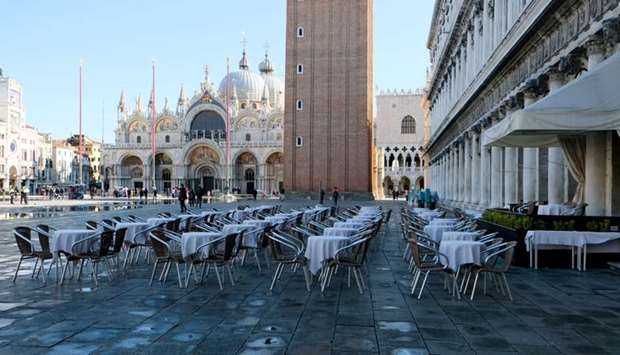* Italy to quarantine 16 million people in wealthy north
* All of Lombardy and 14 provinces affected* Italy facing 'national emergency,' says prime minister
* Italy saw 1,200 new coronavirus cases on Saturday
Italy ordered a virtual lockdown across much of its wealthy north on Sunday, including the financial capital Milan, in a drastic new attempt to try to contain a rapidly growing outbreak of coronavirus.
The unprecedented restrictions, which aim to limit gatherings and curb movement, will impact some 16 million people and stay in force until April 3. They were signed into law overnight by Prime Minister Giuseppe Conte.
The new measures say people should not enter or leave Lombardy, Italy's richest region, as well as 14 provinces in four other regions, including the cities of Venice, Modena, Parma, Piacenza, Reggio Emilia and Rimini.
Conte said nobody would be allowed to move in or out of these areas, or within them, unless they had proven, work-related reasons for doing so, or health issues. Leave was cancelled for health workers.
"We are facing a national emergency. We chose from the beginning to take the line of truth and transparency and now we’re moving with lucidity and courage, with firmness and determination," Conte told reporters in the middle of the night.
"We have to limit the spread of the virus and prevent our hospitals from being overwhelmed," he said.
Italy has been hit harder by the crisis than anywhere else in Europe so far, with the number of coronavirus cases jumping more than 1,200 in a 24-hour period - the biggest daily rise since the epidemic began in the country two weeks ago. The latest total of cases stood at 5,883 with 233 deaths.
Antonio Pesenti, head of the Lombardy regional crisis response unit, told the Corriere della Sera newspaper the health system in Lombardy was "a step away from collapse" as intensive care facilities came under growing strain from the new cases.
"We're now being forced to set up intensive care treatment in corridors, in operating theatres, in recovery rooms. We've emptied entire hospital sections to make space for seriously sick people," he said.
The Milan stock exchange, which has seen a 17% drop in its all-share index since the crisis broke in February, was scheduled to open normally on Monday but one trader said he expected "a violent sell-off" as markets digest the lockdown of Italy's economic heartland.
The World Health Organization said it fully supported the actions taken by Italy, which were in line with its guidelines that governments should try as much as possible to contain the spread of the virus.
But with the Italian economy already on the edge of recession, some local politicians pushed back against the measures, which leaked out before regional governors were consulted.
The head of Lombardy's neighbouring region Veneto, Luca Zaia, complained he had not been properly consulted and was unhappy that three provinces in his region, including Venice, had been included.
"We do not understand the rationale of a measure that appears scientifically disproportionate to the epidemiological trend," he wrote on Facebook.
On Saturday, health officials had expressed alarm at the apparent lack of concern in the general public, as fine weekend weather attracted large crowds to the ski slopes outside Milan. But streets were notably quieter than normal as northern cities woke up to the news on Sunday.
"Given how the contagion has been spreading, I think it was the right thing to do," said Toni Siracusa, a restaurant owner waiting in a queue outside a supermarket in Milan that was restricting entry to prevent close contacts.
He said his restaurant had suffered an 80% drop in business since the crisis broke.
"Tomorrow morning we'll have to have a meeting with staff to decide whether to send people home, put them on holidays or reduced hours or cut pay," he said.
Public transport services were operating and train stations were still running as people caught away from home when the measures came into force were allowed to return. Milan airport authorities also said services were so far operating normally.
There was some confusion about what controls there would be from Monday on shops, offices and factories.
Assolombarda, a business association that represents employers in Lombardy, said it understood the measures would not stop businesses from working or block deliveries of supplies of goods provided appropriate protective measures were adopted.
But the decree said all museums, gyms, cultural centres, ski resorts and swimming pools will be shut in the targeted zones.
Sports Minister Roberto Speranza also said soccer authorities should consider halting top division Serie A matches. Two matches went ahead on Sunday although the Italian Soccer Federation said it would hold an extraordinary meeting on Tuesday to discuss the situation.
Restaurants and bars will be allowed to open from 6:00 a.m. to 6:00 p.m. (0500-1700 GMT) and only if they can guarantee that customers are at least one metre apart.
Church services on Sunday were also cancelled in the region.
Pope Francis delivered his Sunday blessing over the internet from inside the Vatican instead of from a window to stop crowds gathering in St Peter's Square.
On Sunday, the head of Piedmont region said he had tested positive for the virus despite having no symptoms -- the second regional chief to be infected in 24 hours.
As the alarm spread, Czech Prime Minister Andrej Babis said Italy should ban all its citizens from travelling to Europe. Austrian Chancellor Sebastian Kurz said it is only a matter of time until more European countries adopt the kind of aggressive steps that Italy is taking to combat the spread of the virus.

